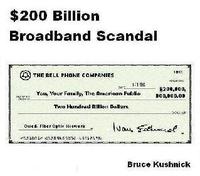History will show one of the salutary impacts of this decade has been an economic experiment, testing the economic viability of monopolies in a changing world.
The Bush Administration has pushed American business toward monopolies and shared monopolies, partly for ideological reasons and partly to make business easier to control. We now know for certain the economic impacts of such a policy.
It does not work.
Proof can be found in news that Vodafone has at least considered making a bid for Verizon, which holds a monopoly on telephone landlines in the eastern U.S. and a stranglehold on the wireless market as well. Its growth as a monopoly was profiled by the $200 Billion Broadband Scandal, the book which occasioned the creation of this blog.
Vodafone, by contrast, holds only mobile phone licenses in the more competitive European and Asian markets.
Vodafone was originally a joint venture between two relatively small equipment companies, Racal and Millicom. It began providing services only in 1985. For most of its history it has lost money.
Verizon, by contrast, was the northeast leg of the old AT&T
monopoly, spun apart in 1984, which then added mobile phone licenses
and, eventually, both GTE and MCI.
Vodafone and Verizon are in bed together because of Verizon Wireless.
This was created through a 1999 merger of Verizon’s regional networks
and Vodafone’s AirTouch, a national network which once did business as
Cellular One in many markets. Today Verizon owns 55% of Verizon
Wireless, Vodafone 45%.
So which is worth more? If you answered the monopoly, you’re wrong. In
the last five years Vodafone’s shares have gained over 130% in value,
and the company is now worth over $170 billion.
Verizon, meanwhile, has been on a roller coaster ride, and while the
general run-up in prices has it up 20% from its mid-2002 price, you would have broken even as late as the end of last year. It is now worth about $130 billion — this for a monopoly that your tax dollars subsidized to the tune of $200 billion over the last decade.
While Vodafone is now denying the rumors of a Verizon acquisition, from
a financial view the deal makes sense. Vodafone could spin out
Verizon’s wired networks for about $90 billion, and essentially get the
wireless for just $40 billion or so. Compare that with the $64 billion Sprint, the number four U.S. wireless carrier, is presently worth and you have a real bargain.
Now imagine what Verizon could do if it were run as a competitive company, and not as a monopoly.
There is a reason for all this. Stock investors value earnings, and
earnings potential. They do not value assets. Monopolies are
accumulations of assets, whose earnings potential is whittled away by
the cost of maintaining the monopoly, the bloat that naturally occurs
when the business muscles aren’t exercised.
By endorsing monopolies, the Bush Administration has done as much
damage to the national security as it has in any other way. Our economy
is weaker, our companies are weaker, our future is weaker because we’re
weakened by monopolies, duopolies, and oligopolies.
The next government must reverse course or American business is going into the crapper.












I don’t think Bush has pushed businesses towards anything. It’s more that he has stood aside and let them do whatever they want without regard to the public interest. The end result, though, is the same. Interesting idea about a competitive company being worth more than a monopoly. From a public markets perspective, this should be correct. After all, price of a stock is primarily about potential for future earnings (growth). Meanwhile, by its very nature the growth possibilities of a monopoly are extremely constrained. What is interesting is that if you actually own a company, monopoly is the way to go (see Carlos Slim), but if you want to invest in a company, then you look for competitive markets (i.e. growth).
I don’t think Bush has pushed businesses towards anything. It’s more that he has stood aside and let them do whatever they want without regard to the public interest. The end result, though, is the same. Interesting idea about a competitive company being worth more than a monopoly. From a public markets perspective, this should be correct. After all, price of a stock is primarily about potential for future earnings (growth). Meanwhile, by its very nature the growth possibilities of a monopoly are extremely constrained. What is interesting is that if you actually own a company, monopoly is the way to go (see Carlos Slim), but if you want to invest in a company, then you look for competitive markets (i.e. growth).